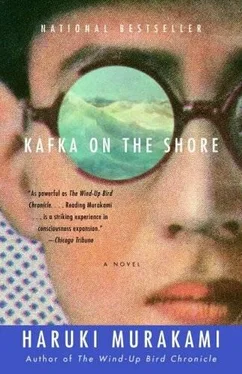Haruki Murakami - Kafka on the Shore
Здесь есть возможность читать онлайн «Haruki Murakami - Kafka on the Shore» весь текст электронной книги совершенно бесплатно (целиком полную версию без сокращений). В некоторых случаях можно слушать аудио, скачать через торрент в формате fb2 и присутствует краткое содержание. Жанр: Современная проза, на английском языке. Описание произведения, (предисловие) а так же отзывы посетителей доступны на портале библиотеки ЛибКат.
- Название:Kafka on the Shore
- Автор:
- Жанр:
- Год:неизвестен
- ISBN:нет данных
- Рейтинг книги:3 / 5. Голосов: 1
-
Избранное:Добавить в избранное
- Отзывы:
-
Ваша оценка:
Kafka on the Shore: краткое содержание, описание и аннотация
Предлагаем к чтению аннотацию, описание, краткое содержание или предисловие (зависит от того, что написал сам автор книги «Kafka on the Shore»). Если вы не нашли необходимую информацию о книге — напишите в комментариях, мы постараемся отыскать её.
The opening pages of a Haruki Murakami novel can be like the view out an airplane window onto tarmac. But at some point between page three and fifteen-it's page thirteen in Kafka On The Shore-the deceptively placid narrative lifts off, and you find yourself breaking through clouds at a tilt, no longer certain where the plane is headed or if the laws of flight even apply.
Joining the rich literature of runaways, Kafka On The Shore follows the solitary, self-disciplined schoolboy Kafka Tamura as he hops a bus from Tokyo to the randomly chosen town of Takamatsu, reminding himself at each step that he has to be "the world¹s toughest fifteen-year-old." He finds a secluded private library in which to spend his days-continuing his impressive self-education-and is befriended by a clerk and the mysteriously remote head librarian, Miss Saeki, whom he fantasizes may be his long-lost mother. Meanwhile, in a second, wilder narrative spiral, an elderly Tokyo man named Nakata veers from his calm routine by murdering a stranger. An unforgettable character, beautifully delineated by Murakami, Nakata can speak with cats but cannot read or write, nor explain the forces drawing him toward Takamatsu and the other characters.
To say that the fantastic elements of Kafka On The Shore are complicated and never fully resolved is not to suggest that the novel fails. Although it may not live up to Murakami's masterful The Wind-Up Bird Chronicle, Nakata and Kafka's fates keep the reader enthralled to the final pages, and few will complain about the loose threads at the end.
From Publishers Weekly
Starred Review. Previous books such as The Wind-Up Bird Chronicle and Norwegian Wood have established Murakami as a true original, a fearless writer possessed of a wildly uninhibited imagination and a legion of fiercely devoted fans. In this latest addition to the author's incomparable oeuvre, 15-year-old Kafka Tamura runs away from home, both to escape his father's oedipal prophecy and to find his long-lost mother and sister. As Kafka flees, so too does Nakata, an elderly simpleton whose quiet life has been upset by a gruesome murder. (A wonderfully endearing character, Nakata has never recovered from the effects of a mysterious World War II incident that left him unable to read or comprehend much, but did give him the power to speak with cats.) What follows is a kind of double odyssey, as Kafka and Nakata are drawn inexorably along their separate but somehow linked paths, groping to understand the roles fate has in store for them. Murakami likes to blur the boundary between the real and the surreal-we are treated to such oddities as fish raining from the sky; a forest-dwelling pair of Imperial Army soldiers who haven't aged since WWII; and a hilarious cameo by fried chicken king Colonel Sanders-but he also writes touchingly about love, loneliness and friendship. Occasionally, the writing drifts too far into metaphysical musings-mind-bending talk of parallel worlds, events occurring outside of time-and things swirl a bit at the end as the author tries, perhaps too hard, to make sense of things. But by this point, his readers, like his characters, will go just about anywhere Murakami wants them to, whether they "get" it or not.













